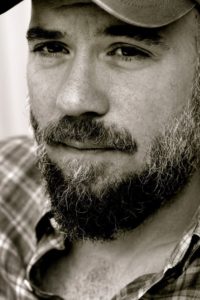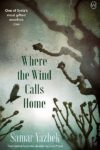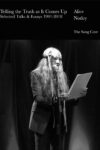 Something that I always struggle to make clear when I discuss my combat experiences is that “the war” isn’t some isolated incident. It’s not an event neatly bound by space and time, but something that follows you home. It grows and changes alongside you. Sometimes it’s like an echo in reverse, getting louder and louder through years, as if it were feeding off of time and experience. The war can show up a thousand miles from the battlefield, standing over your bed and staring down at you like a ghost, more powerful as a memory than as an actual event. To borrow a phrase from the Spanish novelist Javier Marias, time doesn’t have the time to allow itself to be time. But violence can master time and memory and place, distending them and using them as medium to express itself.
Something that I always struggle to make clear when I discuss my combat experiences is that “the war” isn’t some isolated incident. It’s not an event neatly bound by space and time, but something that follows you home. It grows and changes alongside you. Sometimes it’s like an echo in reverse, getting louder and louder through years, as if it were feeding off of time and experience. The war can show up a thousand miles from the battlefield, standing over your bed and staring down at you like a ghost, more powerful as a memory than as an actual event. To borrow a phrase from the Spanish novelist Javier Marias, time doesn’t have the time to allow itself to be time. But violence can master time and memory and place, distending them and using them as medium to express itself.
Not many contemporary war stories acknowledge this—that war outlasts war. It competes with time and place and identity for a sort of existential superiority. Odie Lindsey, himself a veteran of Desert Storm, keeps this complex relationship (or competition) between war and “real life” at the center of his work. His recently published first book of stories, We Come To Our Senses, complicates the “war story” as a genre, setting war in its proper place alongside things like disease, poverty, home, and love, in the full rendering of the lives of his characters. He gives to war its proper power as well as its appropriate subtlety. He doesn’t use war as a cheap trick in order to affect a resigned faux-nihilism. His characters wouldn’t put up with that kind of bullshit anyway.
In other words, he’s honest.
I had the opportunity to talk to Odie, who is currently set up in Nashville. This is just a portion of the wonderful conversation we had, lightly edited for clarity and length.
Scott Beauchamp: Before I read We Come To Our Senses I was expecting war stories, but that’s not what they really are. Wars are there, multiple wars, they’re omnipresent, but they share equal billing with things like domestic violence, disease, loneliness, etc. Do you consider these war stories?
Odie Lindsey: I do, but one of the thrusts of the work has to do with how to imagine or reimagine the war story. To give you a bit of background, I served in 1991 and I rarely spoke about and certainly didn’t write about my deployment until 2003, while watching a new generation of young people deploy back to the same place where I served. And at that time I was just flooded with emotion and memory and I realized that so few of us have an investment in a deployment—I mean it’s something like 1% of the American population who has a family member who is or has been on active duty—, so I just wanted to pursue a narrative that would bring tangential notions of war home. How can I involve people in this process who aren’t involved, who see this at a remove? And so I wanted to ratchet up the tension in the home space a little bit.
Another thing for me was being at a remove myself. I was 12 years older and had lived a long time post my own deployment and I realized, wow, I still think about this every day. I have colleagues who go to the VA once a week and still nobody can figure out what’s wrong with them. And so I thought about the legacy of trauma, whether acute or not, and how some people say “OK, you were deployed from this time period to this time period, the end.”
And so building from those two things I just wondered how thin I could pull the thread. What is ‘war culture’, for instance? What’s it like for young men to be indoctrinated into these things? What’s it like for the children of veterans? So, war stories? There’s not a lot of combat or battlefields. It’s really more about the social and cultural legacies of war.
That makes sense, and it leads me to another question. I know the relationship between an author’s biography and fiction can be really complicated, but I sensed so much of you in these stories that while I was reading I was creating, maybe even unconsciously at first, this dossier in my head of who I thought you were: maybe raised and lives in Tennessee, maybe spent some time in Chicago, maybe L.A., some sort of connection to Mississippi. So tell me about the relationship between your life and your writing.
First and foremost, I think one of the strongest influences on me has been place. For lack of plot I really do love a sense of place. And I have moved quite a bit, primarily in the South but also Chicago, and I spent some time living overseas. I think most of these stories were written between L.A., Nashville, Oxford, Mississippi, and Austin, Texas. So place is really strong from me.
I think one of the hardest things for me to learn while trying to write, again in this awfully big space between where I started the initial sketches of the book in 2003 and where I ended up, was to balance the fiction and nonfiction. And I realized that I needed to stop writing about myself, but still fill the narrative with details that I knew to be true. And that was hard. Like any other writer I cycled through a couple of novels and countless short stories initially that were all strikingly familiar to things that had actually happened to me. And they were all really flat. At some point I thought I could describe things and scenarios that I’ve seen, and I could recall cultures and the feeling of certain cities, but I could populated those scenarios and spaces with people that I’ve never met. And what happens then is that the characters become people who populate me. It’s a really weird relationship, you know?
So I think for me a big struggle was how to remove the big capital “I”, but to let the writing still be informed by my experiences and observations. For example, at one time I dated a woman who was HIV positive. She was a spectacular person. But once you got over the big flashing neon sign of “HIV positive”, at the end of the day, it was the minute little things that dictated the success or failure of each moment. It was more about the mundane day to day elements, and I think that’s usually the case when someone is involved with anyone with a chronic condition. And this wasn’t in Mississippi, this wasn’t even in the United States. She had nothing to do with the character Darla who is in three of my stories. And yet, taking the details from my day to day experiences, I thought “wow, I’m going to write a story that involves this condition or these people, but it’s not going to be the big HIV nor is it going to involve the person that I was or the person that my partner was.”
Talking about place, a lot of the stories take place in the South. I grew up in Missouri and Georgia, so in the stories when you use the phrase “your people” I felt like I knew what you were talking about. But it seems like a big question in a lot of these stories is what it means to be Southern. So what does that mean to you, and why is it an important question for you?
Yeah, I think it’s a critical question for the South. I think the South has yet to reconcile itself to its own complexity. It’s not exclusive to the region, but I think we have this sense that we need to hold onto one single narrative. You’re either pro-South or you’re anti-South. You’re Left or Right or whatever. I think we’re more than capable of understanding multiple narratives simultaneously and in the South I think we’re still fighting over which one is the right one.
I was just in Mississippi, in Oxford, and the county had just voted not to fly the state flag, which still contains the “stars and bars.” And it’s wild because you have all these buildings, except for the Federal courthouse, that are flying different flags. The university said, “We won’t fly that flag because it’s offensive.” Meanwhile, on the outskirts of town, there’s a huge billboard with the state flag that says, “You take our money, you fly our flag.” So you have this incredible tension going on. You have the social tension and tension over the symbolism and the deplorable history. You know, nobody flew that flag really until post-1964, until after the Civil Rights Act, and so we’re constantly creating history and generating notions of what this culture is and I don’t think we really know.
With respect to this book, whether it’s Asheville, North Carolina or Nashville, Tennessee, or any small town, and I assume this is true in Georgia and throughout the region, our town squares are filled with memorials to specific types of soldiers. When I was at the Texas Book Festival there were almost a dozen Civil War memorials there, all commemorating white Confederate soldiers, and right beside them in the real world were Sikh families and quinceañeras. So you have this schism between what is, in terms of bodies that are here, what was, in terms of bodies that people wanted to draw attention to and memorialize, and they coexist. And people fight over various versions of that.
I think maybe this goes along with exploring place and regions, but I felt like class also plays a big role in your writing. I recognized people from my own life, from my own family, in some of your stories. Your characters aren’t just boilerplate, two-dimensional working class figures. They feel authentic. There’s an authenticity to their lives and their motivations. And it was surprising. I rarely come across stories about these people. Why do you think that is? Why is it important to you to tell their stories?
Well, I think when you’re exploring place—and this is true not only in the South but especially in the South—you also have to explore notions of race, ethnicity, gender, sexuality, and certainly class. These lenses define who we are, who has access to what, how people are judged. And I want to be expertly clear in this. I’ve done as much research as I can and I want to be as mindful as I can. But certainly within that structure, I’m sitting here, a straight white guy who is writing about characters, and I want to be as mindful as I can about that too. But I think these different experiences and identities are a vital part of writing about the South.
And it’s certainly also vital to my experience in the military as it relates to this book. The vast majority of the people I served alongside were from working or middle class backgrounds. And I think that acknowledging that adds complexity as a corollary to these other social issues. The rural South or Midwest or any other fly-over state, these places often get summed up a little too easily. For better or worse maybe. Maybe some people deserve it. Maybe some people don’t. But there’s definitely a lot more complexity there than usually gets acknowledged.
I want to go back to something you just said, about being a straight white guy and articulating the experiences of some of these characters. Specifically in the story “Colleen”, which I thought was particularly devastating. After reading it I had to actually put the book down and hold my girlfriend for a while. It’s a really powerful story. But how do you do it? How do you write about sexualized trauma from a female perspective?
Again, as mindfully and as truthfully as you can, complimented by empathy, research, and relentlessness. Going back to the genesis of this book in 2003 when I was watching this new war, this new deployment happen. Early on in the conflict there was this woman, Shoshana Johnson, who became a POW. Her convoy was attacked, she was shot in her legs, and the next thing you knew her picture was on the television screen. I was trying to pursue questions like “how do I tell stories that maybe haven’t been told as often” or “how do I represent other sides of this war narrative”, and then I saw Shoshana Johnson and I wondered where her story was. Where are female stories or less traditional soldier stories? And I just started really meditating on that.
And “Colleen”, just one day I thought about her, and I thought about that when I came back from my deployment the community treated me as even more of a man. And I wondered how a female soldier from a rural environment was treated differently or the same when they came back from a deployment. And so I really did latch onto this notion of someone in a rural setting who had been through a deployment and treated a certain way, and what happened to her when she got home. And likewise, some of the suspension of social mores. There’s a moment where she’s driving out into the desert and she’s on her own and she’s doing her thing and there’s a sense of agency in the war that she doesn’t experience at home.
I did graduate work with the late Barry Hannah, and the one thing he would insist on is that you just drove into the truth. Not above it, not beside it, not around it, not admire it from a distance, but that you just drive straight through it. For me, that was a reminder to not only be mindful, but to really charge in to a version of the truth, which was “Colleen.”
To sort of stop and take things in a completely different direction: animals. In your stories birds fly through windows, there are turtles with shattered shells, alley cats survive against all odds. Your stories are populated with animals. What do they mean to you?
Man, I just love animals. It’s funny, it wasn’t an intentional inclusion. I just adore animals. And I feel helpless around them and maybe there’s some sort of dynamic there between how important they are to me and my inability to interact with them or affect what they do. Living in a place like rural Mississippi you come up on turtles and dogs that are hit on the side of the road all the time, and birds fly into your house. Kind of a funny aside with respect to the bird that flies in through the window in “Bird on Back”, I was sitting outside one day and these cedar waxwings were congregating around a shrub eating berries and one of them just flew into a window and died at my feet in the backyard. It was just awful and traumatic for me. I said to a friend that this thing happened and I have to write about it and he said, “Yeah, well that’s actually the first couple of lines from Pale Fire.” A cedar waxwing bounces off a windowpane. And I thought, oh shit, I can’t have it bouncing off a windowpane, it has to actually fly in.
When I thought about it after the fact, there’s certainly a running cliché within combat stories in general about animals being shot. There’s the story about Apocalypse Now, all these Vietnamese people are shot and nobody flinches, but when they go into a basket and pull out a puppy audiences across the nation were horrified.
I wanted to ask you one last question, it’s vague and big, but people always ask me and so I decided that I’m going to start asking other veterans just to see if they can come up with better answers than I have. Why did you join the Army?
Actually, my parents signed me up when I was seventeen. I joined the Army because my father had served and my grandfather had served. But more specifically, I joined because I was a ne’er do well kid. I was a half-assed student and I was getting into a lot of trouble. And it was put to me that, not only would it teach me a lot of valuable skills, but it would help me go to college and help me pay for college. But I think you’re right to say that you ask people and it’s hard to come up with an answer, because who knows why. There may be myriad reasons but it’s hard to slap a single answer on a single person.
I’ll tell you a harder question. Would I recommend to other people that they join? Part of me wants to say absolutely not, but my goodness, where would I be if I hadn’t had that experience?
Scott Beauchamp is a writer living in Bath, Maine. His work has appeared in The Paris Review,The Baffler, Bookforum, and The Washington Post, among other places.
This post may contain affiliate links.







